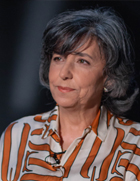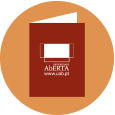E-learning and the Virtual Pedagogical Model®
In 2008 Universidade Aberta became a reference European institution in the area of advanced elearning and online learning through the recognition of its Virtual Pedagogical Model, unprecedented in Portugal and developed by this institution around four cornerstones: student-centered learning, flexibility, interaction and digital inclusion. Since then all degrees and lifelong learning courses are available online and make use of those methodologies and tools.
“The advances in technology have been driving distance education to find new teaching and learning methodologies, rethinking the technological mediation characteristic of distance education programs in terms of new forms of interaction, particularly the interaction among students […]. The new means of communication through the web allows us to set up new virtual learning contexts, where both directional (teacher-student) and multidirectional (student-teacher and student-student) communication is possible (one-to-one, one-to-many and many-to-many communication). We can, therefore, create virtual classes where students and teachers interact at anytime from anywhere.
[…] This approach, going beyond instructional methods and tasks, requires the adoption of pedagogical strategies that engage students as active participants, leading them to develop metacognitive skills (learning to learn) and take a constructive attitude regarding their capacity of self-realization towards lifelong learning, becoming more and more autonomous and being able to interact responsibly in group.”
In Universidade Aberta’s Pedagogical Model for Distance Education, UAb, 2008 (p. 10-11)
The ECTS credit system
Universidade Aberta officially applies the European Credit Transfer and Accumulation System (ECTS) to its pedagogical offer, being this application defined in the Portuguese Republic Official Journal (Diário da República, 2.ª Série – N.º 158 – 18 de agosto de 2011.)
ECTS is used for all study programs, including lifelong learning courses and it serves both mobile and non-mobile students, making easy to compare study programs both at national and international levels.
ECTS is a student-centered system based on the student workload, i.e., the time a student takes to complete all planned learning activities. A full-time student is expected to accomplish 60 ECTS during one academic year (30 credits per semester). At UAb, 1 ECTS stands for 26 working hours.
Further information on ECTS credit system please check the European Commission website.
The Diploma Supplement
In December 2013, the European Commission awarded the Diploma Supplement Label to Universidade Aberta for the period 2013-2016.
The Diploma Supplement is a document which accompanies all higher education diplomas, providing a standardised description of the nature, level, context, content of the studies completed by its holder.
Please notice that it does not replace the Diploma or the Curriculum Vitae under any circumstance.
The Diploma Supplement favours mobility and access to lifelong learning opportunities. It promotes transparency in higher education and fair and informed judgements about qualifications. It also accommodates rapid changes in qualifications.
National higher education institutions produce the supplement according to a template jointly developed by the European Commission, the Council of Europe and UNESCO/CEPES.
At Universidade Aberta, each graduate receives the Diploma Supplement automatically, free of charge issued in Portuguese and English.
Diploma Supplement/Suplemento ao Diploma
• Blank template / Modelo em branco
• Completed template / Modelo preenchido
Further information at the Portuguese Directorate-General of Higher Education DGES.







